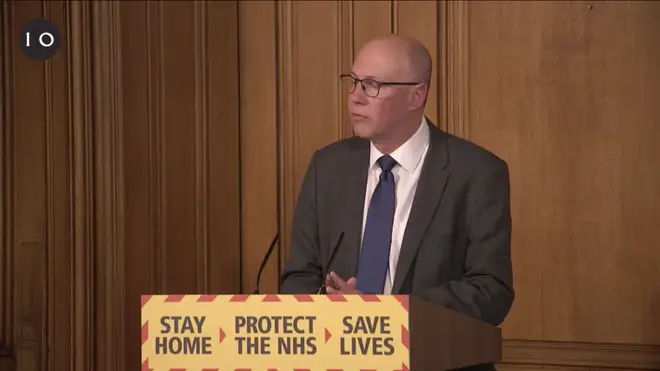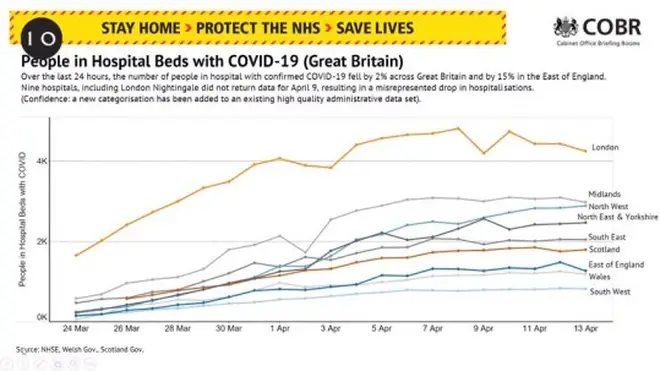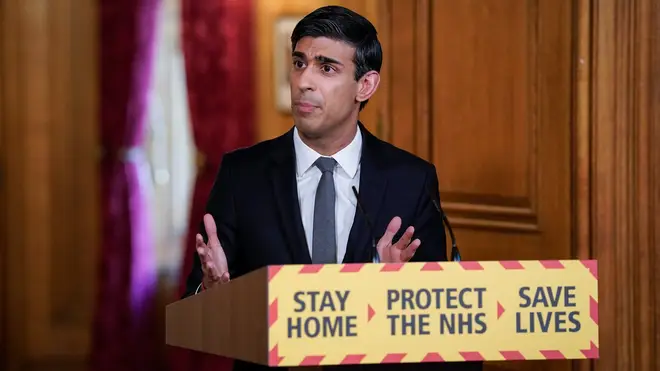
Clive Bull 1am - 4am
14 April 2020, 17:31

The number of coronavirus cases and hospitalisations is beginning to stabilise, the NHS Medical Director has said.
Speaking at today's Downing Street coronavirus briefing, Professor Stephen Powis urged the public to remain compliant with lockdown rules, giving hope that current social distancing measures are having an effect.
Prof Powis said there was "increasing evidence now that the number of hospital admissions is stabilising and plateauing" in London and other areas.
His comments came at the daily briefing which was hosted by Chancellor Rishi Sunak, who reacted to the Office for Budget Responsibility's projection that the economy could shrink by up to 35 per cent and two million jobs could be lost due to the coronavirus outbreak.
Prof Powis said: "This is evidence that is now accumulating that the benefit of that social distancing and reducing transmission is now beginning to be manifest in a stabilisation in hospital admissions.
Read more: Labour leader urges government to publish coronavirus lockdown exit strategy this week
Read more: British coronavirus death toll passes 12,000 after a further 778 die in one day

"We are beginning to see the benefits of the undoubted hardship that we have all been asked to go through in terms of social distancing, in terms of not meeting with friends and family.
"It's really important that those benefits are maintained, that we continue to follow the instructions that we have all been given and we will then get on top of this virus."
However, Prof Powis warned that the daily death toll is likely to be the last curve to reduce in numbers, potentially meaning we have weeks more of high numbers of people dying.
He also added that lockdown compliance levels among the public are "very high", but said: "We need to keep it that way.
"We absolutely need to make sure that we keep the benefits of this going forward and we don't take a foot off the pedal, we don't become complacent."
Read more: WW2 Veteran, 99, raises almost £4 million for NHS by walking in his garden
Read more: Joe Wicks wins Guinness World Record for coronavirus PE lesson

Mr Sunak said there would be "tough times" ahead for the economy and said we "cannot protect every business and every household."
But he added: "We came into this crisis with a fundamentally sound economy, powered by the hard work and ingenuity of the British people and British businesses.
"So while those economic impacts are significant, the OBR also expects them to be temporary, with a bounceback in growth."
The Chancellor also said: "Right now, the single most important thing we can do for the health of our economy is to protect the health of our people.
"It is not a case of choosing between the economy and public health. Common sense tells us that doing so would be self-defeating.
Listen & subscribe: Global Player | Apple Podcasts | Google Podcasts | Spotify
"At a time when we are seeing hundreds of people dying every day from this terrible disease, the absolute priority must be to focus all of our resources - not just of the state but of businesses and all of you at home as well - in a collective national effort to beat this virus."
Asked if the country would be feeling the costs of the crisis for a generation, Mr Sunak said: "This is going to be hard, our economy's going to take a significant hit and as I've said before that's not an abstract thing, people are going to feel that in their jobs and in their household incomes."
"The measures we've put in place can significantly mitigate that impact, in particular the jobs retention scheme, the furloughing scheme we've put in place aims to do exactly that, ensure that fewer people are unemployed but remain attached to their company through the furlough scheme.
"And then also as the OBR says the reason that's a good thing, not just in the short term, which means when we get through this, we can bounce back as quickly as possible.
"I very much hope that the measures we put in place will allow us to do exactly as the OBR have said, bounce back.
"Yes it will be difficult in the short term. I'm happy to be honest about that with people. I think the measures we've put in place will help and then as we get through this it will mean that we can recover quickly and strongly and get our lives and economy back to normal."